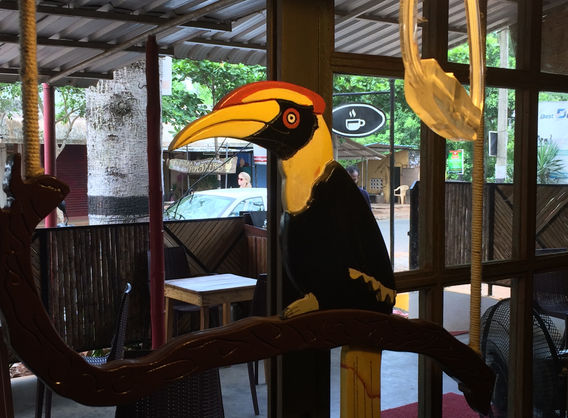
Sustainable Product Design in Auroville & NYC
In 2016 and 2017, I interned with LiGHT-FiSH and Prakrit in Auroville — a UNESCO-supported township known for its bold experiments in sustainable design. Immersed in ecological thinking and material craft, these experiences laid the groundwork for my career as an industrial designer focused on systems, sustainability, and sensorial form.
LiGHT-FiSH
During my time at LiGHT-FiSH, a regenerative design studio based in Auroville, India.
I contributed to projects that blend ecological responsibility with innovative design.
LiGHT-FiSH is a Product Design studio focused on the minimalistic beauty of natural materials. Sustainable materials are carefully chosen and crafted into innovative and intelligently designed products. I explored how light, movement, and material could converge to create poetic, sustainable forms.

My experience at LiGHT-FiSH deepened my understanding of how design can serve both human needs and ecological balance, reinforcing the importance of thoughtful, sustainable practices in product development. Working alongside a multidisciplinary team, I engaged in the full product development cycle—from conceptualization and prototyping to final production.
We utilized advanced tools such as CNC machining and 3D printing, and sourced materials responsibly, including reclaimed wood from local forests.
This approach ensured that our designs not only met aesthetic and functional goals but also aligned with environmental sustainability.


Key Projects & Skills:
-
Custom Breadboards: Designed and fabricated breadboards using acacia wood and brass, involving processes like gluing, sanding, and polishing.
-
Acrylic & Wooden Stencils: Created over 50 laser-cut stencils for a local café, enhancing brand identity through design.
-
Letter Cubes: Produced custom letter cubes with sustainable dyes and acacia wood, utilizing CNC cutting for precision.
-
Marc's Café Logo: Developed a custom logo sign using CNC-milled acacia wood, finished with exterior-grade paints.
-
Perfume Bottle Casings: Assisted in producing over 500 custom perfume bottles with wooden encasings, each crafted from a single block of wood and featuring metal inlays.
Technical Proficiencies:
-
CNC Machining: Gained hands-on experience in calibrating and operating CNC machines for various production needs.
-
Wood Finishing: Experimented with non-toxic, food-safe wood dyes and finishes, ensuring safety and sustainability in products.
Furniture For Prakrit
Designing with Upcycled Timber & Storytelling Through Wood
I worked on custom-designed furniture using upcycled timber sourced from trees felled by the devastating Cyclone Thane that struck Auroville in 2017. Each piece tells a story of regeneration — not only of materials, but of a community committed to sustainable futures. Working in this context shaped my understanding of design as a cultural and ecological practice, grounded in locality but scalable in impact.

Key Projects & Skills:
-
Live-Edge Furniture: Participated in crafting live-edge tables and benches, embracing the natural contours of reclaimed wood.
-
Joinery Techniques: Learned traditional joinery methods, enhancing the structural integrity and aesthetic appeal of furniture pieces.
-
Custom Commissions: Collaborated on bespoke furniture projects, tailoring designs to client specifications while maintaining sustainable practices.
Technical Proficiencies:
-
Material Selection: Developed an understanding of wood properties, enabling informed choices for durability and aesthetics.

Exploring Non-Toxic Wood Finishes
As part of a material exploration at LiGHT-FiSH, we studied non-toxic wood finishes that are safe for children and environmentally sound. The experiment focused on natural dyes made from selective pigments, observing how each reacted with various wood types.
Holistic Learning Outcomes
This residency enriched my design practice by integrating sustainable principles with hands-on fabrication skills. The collaborative environment of Auroville fostered a deeper appreciation for materials, processes, and the impact of design on communities and ecosystems.
MFA Industrial Design - Parsons School of Design 2020
Material as Message
My time in the MFA program deepened my relationship with material — especially wood. I began working with lathe turning, upcycled timber, and natural finishes. Each fabrication process became a system of care: slow, intentional, and locally responsive. Whether through digital prototyping or hand-finishing techniques, I used making as a way to connect sustainability with form.

Lathe Turning & Wood Working with Lacquer
-
Mastered hand and machine lathe techniques to produce custom cylindrical forms.
-
Explored woodgrain expression, toolpaths, and rhythm through repeatable, meditative turning practices.
-
Woodworking & Joinery, I worked across reclaimed and upcycled wood. Honed processes such as mortise and tenon joinery, steam bending, and natural dye finishing — ensuring strength and ecological sensitivity in every form.
Fabrication Technician, Parsons Making Center
At the intersection of craft and curriculum, I worked as a fabrication technician while pursuing my MFA in Industrial Design at Parsons. I managed multiple production pipelines, supported over 600 students with digital fabrication workflows, and implemented a digital approval system for 3D models — significantly reducing prototyping costs and material waste. This role grounded my approach to sustainable design in technical precision and scalable methods.
These experiences are what shaped my Parsons thesis project— Halcyon: Designing with Regenerative Materials
Halcyon is a research-led project exploring the use of biomaterials in 3D printing, with a focus on developing custom filaments made from renewable and biodegradable sources. The project investigates how material sourcing, digital fabrication, and sustainable thinking can converge to create scalable, low-impact design solutions — rooted in ecology, not extraction.























